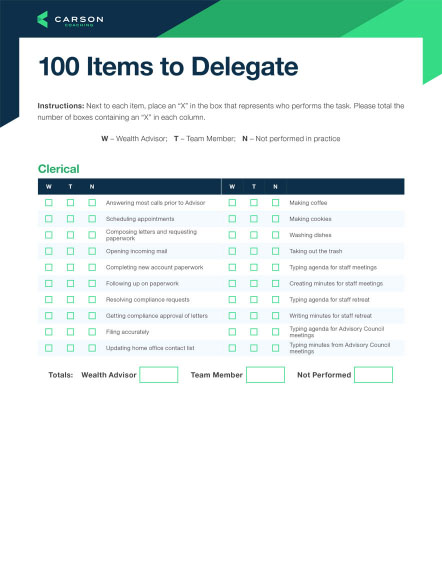Generative AI is increasingly being used by knowledge workers—like financial advisors.
In a recent episode of Facts vs Feelings, Carson’s Chief Strategy Officer Dani Fava noted that 78% of knowledge workers are using AI at work, and up to 50% of those are “smuggling” it in, meaning they don’t have their employer’s approval.
Increasingly, we’re seeing the integration of AI tools across different sectors. And it’s a smart move to start learning how to use and incorporate AI into your firms because Forbes reports that while AI isn’t going to replace workers anytime soon, people who know how to use AI will replace people who don’t.
Plus, Investopedia reported on a KPMG survey that found 84% of financial services leaders said AI is “moderately to fully functional” at their firms.
At Carson Coaching, we are huge fans of delegation to help firm owners, leaders and advisors do the high-impact work that only they can do. And now that AI is entering the fold, we think it’s time to embrace it as part of your delegation strategy.
I recently wrote in the Journal of Financial Planning that you should use a three-pronged delegation strategy: delegating to your team, delegating to gig workers and delegating to AI. In this article, I’m going to focus on ways you can delegate to AI to help you work more efficiently, focusing on the helpful ways our coaching members and other advisors are already doing so.
First Step: Know What to Delegate and Your Firm’s Policies
We’ve developed a resource called 100 Tasks Every Advisor Should Delegate to get you started in thinking about what tasks to take off your plate.
I also like to have my coaching members do an exercise where they input all their duties into a spreadsheet and then rate whether they enjoy or don’t enjoy the specific work. The tasks they don’t enjoy are automatically added to a list of things they should delegate. Then I have them go through the tasks they enjoy and highlight only the work that they can do. The things that are left over are added to the list of things they can delegate.
Then you can dole out these tasks to any of the three prongs of delegation: your team, your contract workers and AI.
But it’s critical before you delegate tasks out to AI to understand your company’s policies and procedures around AI. Sure, you might be tempted to be part of the 50% of knowledge workers smuggling AI into the workplace, but your firm likely has policies in place primarily to protect client data. So make sure you know and follow the rules!
Delegating for Communication
Fava noted in her Facts vs Feelings appearance that the primary use of AI for advisors at this point is for communication-related tasks. Our coaches agree.
Executive Business Coach J.J. Peller said his members are saving around 45 minutes per client or prospect meeting by using AI for notetaking. Executive Business Coach Tammy Breitenbach notes that her members are using it for meeting notes and to email a follow-up summary of conclusions and next steps to their clients.
And while historically our industry has been slower to adapt to new technology because of our highly regulatory nature, we’re starting to adapt primarily generative AI for communication tasks like Peller and Breitenbach illustrated. Fava said that generative AI—which is the type of AI that can generate new content (text, images, audio and video)—is helping advisors with a number of tasks, including:
- Drafting emails. For example, if there was a recent market downturn, you could prompt your AI tool to “Generate an email draft addressing concerns about the recent market drop and encourage clients to call us to review their portfolio.”
- Writing call or video scripts.
- Summarizing PDFs.
- Outlining blog posts.
- Helping to build a framework for content calendars.
- Summarizing meeting notes. One tool our team and members have used for meeting notes is Zocks.io.
- Writing social media posts or deriving social media posts from blogs you’ve already written.
- Customizing messages for specific audiences. Fava gave an example of customizing a message to appeal to savvy clients who work in tech. You could also tailor messages to fit the communication style and preferences of individual clients.
- Doing research. Oftentimes I find myself asking ChatGPT to help me with specific research I’m working on and I ask it to cite its sources, as it doesn’t automatically do that.
- Gauging client and consumer sentiment on certain topics. For example, you can prompt ChatGPT to “Scan news sources for negative sentiment about [insert specific stock or sector here] and if there’s a spike in mentions.”
- Creating meeting agendas.
You can also take it a step further and use AI tools for data analysis and trend spotting, which Investopedia reports is another way advisors are incorporating AI tools.
Always be sure to edit the outputs and double-check everything for accuracy and ensure you don’t use proprietary firm information or confidential client data.
How to Choose AI Tools?
There are so many AI tools out there to help you with your communication tasks. And the ones you choose depend on what you’re looking for. But no matter what AI tools you’re evaluating, Asset-Map has a process to help you choose the best tools for your needs.
- Research and find tools that align with your current needs.
- Get and offer training for your team for the tools you do pick so you can take full advantage of their benefits.
- Evaluate regularly to ensure you’re getting what you need from the tools.
I can’t stress enough how important it is to protect confidential client data and to double-check any outputs from AI tools for accuracy.
Don’t Put Off Delegation
There are a million excuses you could make when it comes to why you can’t delegate. You think you can do things faster, you don’t have time to train somebody else, you’ve tried before and failed—all of these can seem valid. But you want to push past the urge to make these excuses and start delegating. Forbes reports that there are many benefits to delegation, but the primary one is that it’s an investment in both yourself as a leader and in your team.
And while there are tons of other use cases for AI in our industry, we focused primarily on the basic communications tasks you can start delegating to it now. Some of our coaching members are seeing great success with using AI for their meeting notes—which even benefits us. My colleague, Executive Business Coach Greg Opitz, has noted that the meeting notes from some of his coaching members are so good that he asks for a copy to keep in his own records! For a robust list of all the AI tools advisors are implementing, you can refer to the most recent Kitces.com Latest in Financial Advisor Tech.
I know—it’s challenging to let go of the way you’ve always done things. But adopting new ways of delegating and new technologies to help you do so can level up your firm and make you more efficient. Plus, think of how much time you’ll be able to devote to your high-impact work by using AI for routine communication tasks.
If you need help with your delegation through AI journey, get in touch with us! We’d love to help you.


